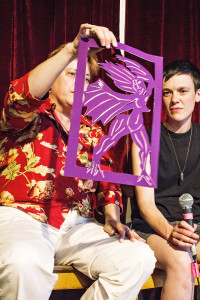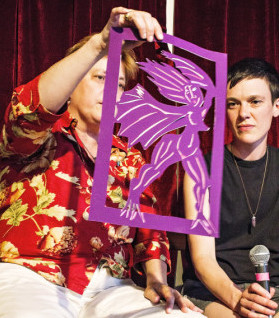
So we’ve been calling She Is Sitting in the Night a collaboration, but if it was that it was largely retroactive—a conversation that started in part before I was born. Literally. Ruth West started working on Thea’s Tarot when I was not yet a zygote, a fact that she is happy to emphasize with phrases like “back when dirt was new,” “when god was a girl, and “you don’t understand because you’re not old enough.” There is a fine line between respecting older generations and being offended by this kind of ageism. Meanwhile, we had printed the book before ever having talked to her, my conversations mediated until last month by email and Rima Athar, the person who bridged us by initiating the project.
For a conversation between a digital art professional and an introvert, email and Skype felt like appropriate communication methods. So the fact that we had invited Ruth to Montreal for a visit and to speak at an event last month was frightening to me. What were we going to talk about, I wondered? Would it be awkward? Even though we’d been ostensibly collaborating for a while, would we like each other? Why were we doing everything backwards?
While we had this basic connection—along with appreciation for coffee at Social Club and small dogs (the latter was mediated by my partner and seemed the crux of what first made Ruth comfortable in conversation with us)—we acknowledged that we came from different worlds in many ways. And that we each lived in a bubble of sorts. And we prodded at those bubbles, gently, Ruth expressing confusion at gender and sexual fluidity on the heels of what she had experienced as a binary scene, and me deeply wishing that MichFest would go away or open up to all women, except that it kept coming up in conversation.*
At the same time, Ruth herself hasn’t attended the festival for years, and I can’t deny its part in a longer history that, in one’s rejection or appreciation of it, continues to inform choices queers make in our communities—around inclusion and exclusion, gender expression and validation, direct action, caucuses, and mud wrestling, among other playful and painful actions. And this preferred disassociation is what makes many of us from my generation—that is, vaguely youngish adults—lose the generous and nourishing parts of lesbian feminist history, and how some of its participants continue to exist in the present (though the amount of queers who have died young in the past several decades is also notable, and informs our current work too).
In any case, we went for coffee, we talked, we drank, we ate breakfast, we read tarot, we took pictures. And the tensions were real, but I’m not convinced they were worth total avoidance of each other. As it turns out, we like each other’s work, which is significant and crucial in this particular relationship, and another reason to maintain this kind of conversation, even if it is after the fact, and brief, and mediated by electronics. We’re hoping to set up a visit to her bubble this summer, too, and we’d like to continue this conversation, now that it’s started and as stilted as it sometimes may be, through sharing art, and prodding at each other about the things that feed us.
__
*In fact, it did close down this year. Metonymy Press opposes the Michigan Womyn’s Music Festival’s exclusion policy categorically and stands in solidarity with trans women’s struggles.
